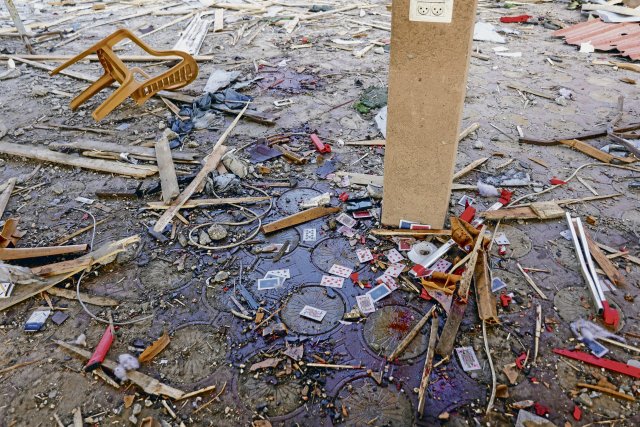Gaza War | Civil Society in the Crosshairs
Israeli rockets and bombs hit the Gaza Strip daily. Drones armed with machine guns patrol the makeshift refugee camps day and night. They often fire out of nowhere, eyewitnesses report; on Thursday alone, 90 people died in various attacks. According to UN reports, more than 500 Palestinians have been killed by Israeli soldiers' bullets in aid distribution centers run by Israel and the US since May. Nevertheless, the June 30 attack on the "Al-Baqa" beach café sent a shockwave through Gaza City. For four decades, the family-run business, just meters from the Mediterranean Sea, was a meeting place for artists, journalists, and liberals – and more recently, a place where many sought to escape the daily trauma of war for a few hours.
"A retreat for my cosmopolitan friends, because of the good internet connection, but also because of the political views of most of the visitors," says Mohammad Al-Masharawi. His 23-year-old sister was sitting at a table on the terrace with friends when a rocket hit right next to them. Forty-one visitors died instantly, according to the director of Al-Shifa Hospital in Gaza City; most of the victims, he says, were women and children. More than 100 injured people are still being treated there days after the attack.
Alleged war crimeHuman Rights Watch and other human rights organizations accuse the Israeli army of using a 230-kilogram MK-82 bomb. Experts identified the type of weapon used based on the bomb crater and metal fragments found. The Israeli army did not specify who it targeted in the attack, but stated that it minimized civilian casualties through aerial surveillance. "Consequently, the army was aware that a crowded cafe was being attacked with this type of bomb," Gary Simpson of Human Rights Watch told The Guardian. "This is an indiscriminate and illegal attack, and an investigation into the war crimes is urgently needed."
Like many relatives of the victims, Mohammad Al-Masharawi repeatedly returns to the ruins of the "Al-Baqa" cafe, searching for his sister's personal belongings. "I found her handbag and her blood on the floor. I still don't have an answer to the question of why she had to die. It makes absolutely no sense to bomb a place like that ."
"The café was considered a safe place for young women like my sister amidst the daily madness. Many spoke there about their war trauma."
Mohammad Al-Masharawi , brother of a victim of the rocket attack on the Al-Baqa cafe
According to eyewitnesses, the café, known throughout the Gaza Strip, was, as usual, filled with visitors from all walks of life. Families displaced from the north, elderly couples who regularly visit, bloggers, and journalists cooled off with a dip in the water in temperatures over 30 degrees Celsius. Afterwards, they sent messages or posted on social media via the free Wi-Fi network and enjoyed the peace and quiet. "The café was considered a safe place for young women like my sister amidst the daily madness," says Al-Masharawi. "Many spoke there about their war trauma."
A regular visitor describes the moments after the impact to "nd": "Wherever people had been working on laptops or drinking coffee seconds before, there were body parts and dead bodies lying around. The images were as unbearable as the silence afterward."
Journalists, artists, athletes among the victimsAmong the victims are many young journalists and artists who were role models for their generation. Photojournalist Ismail Abu Hatab repeatedly took pictures of the Israeli airstrikes in Gaza City from the terrace and disseminated them around the world. His photos of everyday life in Gaza have been shown in exhibitions in the USA and many other countries. The Hatab family, too, returned to the beach on Wednesday to mourn. They had already buried Ismail the day after his death, with the whirring of Israeli surveillance drones constantly above them. Ismail Abu Hatab is the 228th Palestinian journalist killed by the Israeli army since October 2023.
Malak Musleh, the youngest female boxer in the Gaza Strip, also regularly came to Al-Baqa after training. Now she, too, is dead. Also among the victims are visual artist Amina Al-Salmi and human rights activist Omar Zaino. Journalist Bayan Abu Sultan, whose Instagram profile is particularly popular with young Palestinian women, survived with serious injuries. Many visitors believe that the café's popularity among journalists and influencers was the reason for the attack.
"Radicals like Israel's Finance Minister Smotrich want to expel the entire population of the Gaza Strip," says a friend of Ismail Abu Hatab from Gaza by phone. "For them, any meeting place of civil society is therefore a danger, as it refutes their narrative that all Palestinians are human animals and Hamas supporters."

While relatives mourn on the beach, clouds of smoke from the bombings hang over the refugees' tents further south on Friday. The eleven partially functioning hospitals in Gaza City can barely care for the many injured. There are shortages of medicines, medical equipment, electricity, and clean water.
Medical facilities under attackThe shortage of trained medical professionals will only worsen in the future, as doctors are once again being targeted by the Israeli army. On Wednesday, an Israeli air-to-ground missile destroyed the exterior wall of an apartment in Gaza City. It was apparently a targeted hit on the apartment of Dr. Marwan Al-Sultan, the director of the Indonesian hospital. He had just returned home from a shift at the hospital and died along with his wife and children.
The famine is also likely to worsen . An employee of the United Nations High Commission for Refugees (UNHCR) witnessed an attack on two fishermen working in the waters off Gaza. They were hit in the neck and chest by bullets fired from an Israeli naval boat. Since nine trawler crew members died in May of last year, only small boats have been operating off the coast of the Gaza Strip. A virtual ban on fishing will eliminate an important source of food.
nd-aktuell



